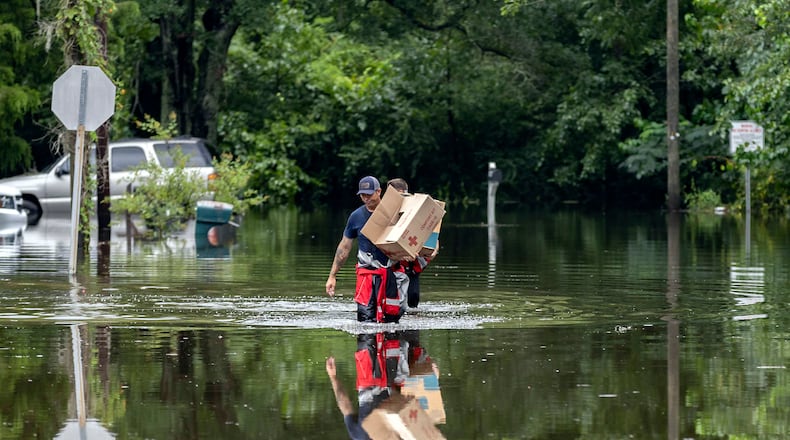Tropical Storm Debby may have left Georgia’s shores but Savannah-area residents are still dealing with the fallout on Saturday, as a burst of flooding has forced roads to close on the south side of the city.
A spokesperson for Savannah said that at least 12-inches of floodwater from the Ogeechee River blanketed the streets near a subdivision, and the water hasn’t yet receded. The city listed a total of 8 streets and a stretch of highway that were closed as of early Saturday afternoon. A nearby fire station is offering emergency resources for residents as needed, according to the city official, and some unincorporated areas of Chatham County were also hit by the floodwaters.
“If there’s a road closed it’s closed for a reason,” the spokesperson said. “We’re just asking folks to stay safe and be patient.”
Debby’s rains triggered flooding across swaths of South Georgia and coastal Georgia, where the tropical storm’s winds also downed power lines and trees in many communities. While the tropical storm wreaked havoc on the state’s coastline this week, the rainfall was still far less disastrous than meteorologists had predicted. Forecasts last weekend had said the storm could 20 inches of rain or more on Savannah and other areas along the coast, which would have come close to the state’s all-time rainfall record. Parts of Savannah and the coast saw localized flooding, but ultimately not the “catastrophic” rain totals feared.
Gov. Brian Kemp said on Friday that coastal Georgia “got lucky” after one storm model had indicated Debby could hit Savannah a second time after crossing into the Atlantic Ocean. But the torrential rains caused “significant” damage to dams, roads and farming communities in the state, he said, and that authorities were still assessing the extent.
Chatham Emergency Management Agency said on the social media website X, that anyone wanting to help those who have been affected by the flooding should donate to nonprofit organizations like Second Harvest of Coastal Georgia and United Way of the Coastal Empire. Under no circumstances should people try to drive through flooded roads, the agency said.
The National Weather Service was even more blunt when warning of the potential hazards that come with swimming in floodwater.
“We know some of you are thinking about swimming in the floodwaters left by #Debby. That’s a bad idea,” the NWS said on X before listing out the possible dangers, like exposure to waste or other contaminants.
Debby finally moved out of the U.S. on Saturday after the storm spent the better part of a week unleashing tornadoes and flooding, damaging homes and taking lives as it moved up the East Coast after first arriving in Florida as a hurricane.
Debby’s last day over the U.S. before blowing into Canada inundated south-central New York and north-central Pennsylvania with rain, prompting evacuations and rescues by helicopter. The post-tropical cyclone continued dropping rain on New England and southern Quebec, Canada, on Friday night with conditions expected to improve Saturday morning as the system continued moving northeast.
— Material from The Associated Press was used in this report.
About the Author
Keep Reading
The Latest
Featured


